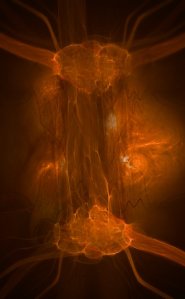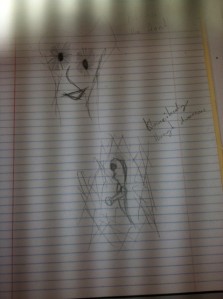Steven Lipton
Professor Steven Wexler
English 313
08 October 2013
The Rise of 1917
The idea of a revolution for social and economic equality is not absent in the American conscience, rather, it is suppressed through many mediums: entertainment, deceiving journalism, over promised leaders, and a sense of doubt in self. But specific actions, like Occupy Wall Street, have risen above these mediums to spread light on the influence of government actions caused by corrupt corporations. My film, “The Rise of 1917,” reminds its audience the success a revolution can have. It retells the story of Russia’s Revolution in 1917 by uniting its citizens to rise against political corruption through the help of an unknown element.
1917 takes on a very important role in world history. Not only does it involve itself during the First World War, but more importantly the Russian Revolution. Russia’s participation in WWI was forced on behalf of Serbia’s actions against Austria. This, coupled with an autocratic Russia subjected many lower class citizens to the horrors of war without the supplies to defend themselves from the enemy or the elements. Russia’s lower class citizens, now on their hands and knees, needed liberation from their leader: Czar Nicholas II. In “The Rise of 1971” a young man, Oliver Haúnt, comes as the voice of optimism and consolation to unite the lower class and help revolutionize Russia into the first communist country. Though, he is a man by nature, he is not recognized by the citizens of his name. Rather, he calls himself The Sushchnost (Russian for entity) for the way he appears: as an apparition to the many important figures (Vladimir Lenin) and citizens during Russia’s revolution.
The film begins in 1866 with Oliver’s father, Adam Haúnt (William Dafoe), and the founder of the periodic table, Dmitri Mendeleev (Daniel Day Lewis) in Moscow, Russia. Adam is arguing with Dmitri in a lab about the addition of the last element to their periodic table. Dmitri urges Adam that 119 (an unlisted element in the periodic table) is too unstable and radicle for the public’s interest. Adam, who is the founder of 119, eagerly tries to convince him by reminding Dmitri of their equal partnership when it comes time for the Russian Chemical Society to view their thesis. Dmitri is set on removing Adam from their project all together. He brings up the notion of power, and the public’s interest in power is not always level minded. He continues by saying “power, while certainly constraining, is also enabling! Cultural studies have shown a specific concern with subordinated groups, at first with class, and later with races, gender, nations even!” (Barker, Cultural Studies 10). This confliction of ideas between them grows with more arguing. Eventually we see Adam exit the lab into a Russian storm.
The film’s introduction examines power and discipline. Where Adam wants to introduce power, Dmitri wants to remove it for he fears it will corrupt something or another. Later in the film we find that Adam’s intention to introduce “119” would take a path of its own. He hopes to succeed Dmitri’s periodic table by introducing the world to its newest element. Thus, allowing him nobility. Dmitri tries to explain to Adam that the world they live in is already corrupt with power and the introduction of anymore, under an autocratic nation, will never serve a humanitarian purpose. “Ideology as power” (Barker 71) explains, through early Marxist and sociological concepts, that power is associated with the dominant class. In this film’s case that would be the aristocrat class.
Three years pass and Adam is sitting in his living room with his tall, broad shouldered wife, Evelyn, (Lucy Lawless) and his son, Oliver (Jake Gyllenhaal). The newspaper that sits on the coffee table has a headline that reads: “6 March, 1969: Russian Chemical Society to Reward Dmitri Mendeleev for the most Conclusive Periodic Table to Date” (“History of the Periodic Table.” RSC. Web 28). Oliver asks his mother when their next mountain climb is. Adam responds, “December 8th, our anniversary.” We see time pass and stop on the date of Adam and Evelyn’s climb. Oliver waves goodbye from the car and heads back home. Many weeks go by without word from his parent’s progress. He later finds that they were buried and presumed dead from an avalanche of snow.
Many years pass. It is the middle of WW1 and we see Oliver hanging out in his father’s lab reading the obituaries with a headline: “1st December, 1915: A night for the Living and a Morning for the Dead.” Oliver reads one of the names under his breath. “Dmitri Mendeleev.” In the background there is a radio. It is on a local talk station and a voice can be heard. The radio host is discussing the poor progression of the war: “What are the citizens of Russia to do when our supposed leader cannot even spend any of his precious wealth on food or supplies for his soldiers?! There needs to be a stand! What does Uncle Marx say in our position!? He says ‘capitalism engenders class conflict and sows the seeds of its own destruction!’ (Barker 193). That’s right people!” The radio goes off and on due to a winter storm. It comes on again and we hear the host screaming for what we think is a struggle between two men but the static makes his words ambiguous: “We as citizens—revolu!—My office is closed to Nicholas!—what?! People, our freedoms are—suppressed! Our own military—let me go! I’ll leave!” We see Oliver play around in the lab. He eventually stumbles upon a cold, steel test tube marked “119.” He opens it. A gas explodes in his face contorting Oliver’s skin. We see his gruesome transformation which eventually dissolves every particle of his body. He eventually disintegrates into a gas like figure. The radio host comes on again: “We have to change people! To hell with this war—to hell with Nicholas!” Struggling between men can be heard from the radio while we see Oliver, now ghost like—yet figureless appearance, fade through the cracks of the lab’s door. The wind catches what is left of him.
This would be my most important scene. The relationship between “119” and Oliver is symbolic of WW1 and Russia’s struggle during this war. The element represents two things: the foreign invader (Austria/Germany) and the corruption of power as mentioned earlier. When Oliver succumbs to the element’s properties it is symbolic of Russia succumbing to the war—though more importantly, how the citizens succumb to autocracy. The radio host symbolizes the idea of freedom and the corruption they live when he quotes Karl Marx.
Continuing, somewhere in a deserted Moscow we see deformed footprints formed in the snow that has blanketed the city. It is Oliver trying to reconstruct himself but to no avail. He continues to traverse through the snow storm with little effort due to his fog like form. He happens upon a young Vladimir Lenin cursing his father’s name (Ilya Ulyanov) in the storm. As Oliver grows near Lenin he feels his atoms beginning to unite, creating a tall male figure. Unable to control his new properties he chooses not to fight and let himself evolve. Foreign memories race through Oliver. They are Lenin’s memories from when he was a child. Mostly of the time spent with his father and the relentless academic pressure his father placed on him. Oliver’s foreign memories grow stronger in Lenin’s proximity. They eventually conclude with one last memory; the death of Ilya via a brain hemorrhage.
This marks the beginning of Russia’s lower class rising with the help of Oliver and ultimately Lenin. In the next few scenes we see how Oliver provides closure and affirmation to Lenin by utilizing his father’s image.
Oliver, now anthropomorphized as Ily, advances towards Lenin. Lenin screams in anger at the loss of his father. He fights the winds with his words and eventually sees a ghost like figure slowly approach him through the ravage winds and snow that saturate the air. It is Oliver, but what Lenin sees is an apparition of his father. Lenin cautiously engages Oliver: “Father?” Oliver is uncertain what to do with his new abilities. He feels inclined to do something good but does not know the right words: “Hey kid, why all the yelling?” Lenin, angered, answers back: “Because you left me! Mother and son! And with the only intention of progressing me as a scholar! Rather as a son!” Oliver feels this is too much for him, but with all of Lenin’s memories racing inside he feels inclined to say something with wisdom; “Lenin, do not undermine my actions, for you might undermine your own.” Oliver dissolves into the winds and leaves. Lenin looks into the storm, uncertain of what just happened.
Oliver’s first encounter in his new form sets the exigency of the film. He learns that his abilities allow him to take a ghostly shape of people’s idols. The more familiar he becomes with himself the more active he participates in the lives of Russia’s citizens. He applies his abilities to the greater good of his nation by bringing hope and reason to the soldiers and potential leaders. I tried to accurately fallow the timeline between Dmitri Mendeleev up to the Russian Revolution. The man on the radio discussing the unarmed soldiers are accurate occurrences during the war that I found through my sources. And the relationship with Lenin and his farther are also as accurate as the sources I could find. By utilizing a mix of history and fiction I attempted to create a fun perspective about what helped influence Russia’s Revolution. Since everyone sees Oliver as people of their past, rather than what he is, it implies that the citizens of Russia were united and influenced on their own accord. The film fallows Oliver’s journey between 1915 to the day of the Russian Revolution on March 8, 1917. His quest illustrates his attentiveness to the lower class and how he uses his powers to help influence reform. Though the film largely develops around Oliver’s contribution it will still grasp the power of the Russian Revolution. It will demonstrate that citizens of any nation, when united, can overcome any regime or political corruption. By the end of Russia’s Revolution Oliver will continue to traverse the globe to help suppressed citizens with his abilities. The film ends in 1922 when Lenin is Chairman of the Council of People’s Commissars of the Soviet Union. Oliver takes on a disfigured shape of his father while standing on a tall mountain overlooking Moscow. He disintegrates into the winds and travels west, implying his destination will take him to the United States of America. Then the film ends.
Work Cited
“Dmitri Mendeleev.” History of the Periodic Table. Royal Society of Chemist , n.d. Web. 28 Oct. 2013. <http://www.rsc.org/education/teachers/resources/periodictable/pre16/develop/mendeleev.htm>.
Barker, Chris. Cultural studies: theory and practice. London: SAGE, 2000. Print.
“Vladimir Lenin biography.” Bio.com. A&E Networks Television, n.d. Web. 28 Oct. 2013. <http://www.biography.com/people/vladimir-lenin-9379007>.
“Dmitri Mendeleev.” History of the Periodic Table. Royal Society of Chemist , n.d. Web. 28 Oct. 2013. <http://www.rsc.org/education/teachers/resources/periodictable/pre16/develop/mendeleev.htm>.


